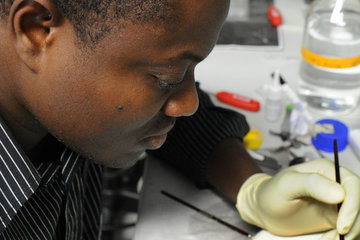Innovative science in the spotlight
Four Max Planck projects secure the ERC Consolidator Grants 2023
The Max Planck Institutes in Bremen, Heidelberg, Leipzig and Martinsried are delighted to receive the prestigious Consolidator Grants, each worth around two million euros. They are awarded to researchers who completed their doctorate a few years ago and are looking forward to a promising scientific career.

They are investigating giant viruses, using origami DNA to optimise vital enzyme functions, researching microbes as potent sources of biofuels or reconstructing neighbourhood structures in prehistoric times with the help of ancient DNA from sediments. These are the four grantees and their projects:
Human Sciences Section
UNEARTH - traces ancient social structures with sediment DNA
Benjamin Vernot - Max Planck Institute for Evolutionary Anthropology in Leipzig
Humans and other living beings are constantly shedding DNA, and this DNA can be preserved in archaeological sediments. In contrast to fossil skeletal remains like bones and teeth, these sediments are abundant at nearly every archaeological site. This ancient human DNA from sediments may function as forensic “breadcrumbs” to trace the spaces inhabited by past humans, their life histories and socioeconomical structures. The research project UNEARTH of Benjamin Vernot, leader of the Max Planck Research Group for Ancient Environmental Genomics, will integrate genetic, bioarchaeological, and isotope analyses to uncover socioeconomic stratifications and their role in prehistoric neighborhood organization more than 5,000 years ago during the Early Bronze Age. Read more.
Biology and Medicine Section
CAPSOLUTION - investigating the diversity, functions, and evolution of giant viruses
Matthias Fischer - Max Planck Institute for Medical Research in Heidelberg
Viruses are notorious as pathogens. Less well known is their ecological significance, for example in the control of bacterial populations, the preservation of microbial biodiversity and their positive influence on nutrient recycling. Viruses are also important for the evolution of cellular life, as they engage their hosts in an evolutionary arms race that leads to molecular evolutions. Despite these important findings, knowledge about the world of viruses is still limited to a few model systems. Matthias Fischer's research group is investigating the diversity and infection biology of viruses, in particular so-called "giant viruses". They are a largely unexplored group of viruses that have unusually complex genomes and particle structures. With "CAPSOLUTION", the team will investigate the diversity, functions and evolution of giant viruses. Over the next five years, the scientists will explore high-mountain lakes in the Alps for giant viruses and study their special surface structures in the laboratory. Preliminary studies have shown that virus particles from environmental samples often deviate from known patterns. The functions and evolutionary origins of these novel virus structures will be investigated as part of the funded project. Read more.
NanoCat - using DNA origami to improve enzyme functions
Amelie Heuer-Jungemann - Max Planck Institute of Biochemistry in Martinsried
All life depends on enzymatic reactions. These are used, among other things, when we are eating. For example, when we eat a potato, the enzymes in our saliva break down the starch contained in order to produce sugar. We can then use this as a source of energy. However, the introduction of "foreign" enzymes into other living organisms through genetic engineering often means that the enzymes cannot perform their tasks properly or even not at all, as the efficiency of such enzymes is naturally increased by encapsulation. The NanoCat project, led by research group leader Amelie Heuer-Jungemann, aims to artificially develop such encapsulations. This is intended to preserve the function of the enzyme activity, even if they are introduced into organisms in which they normally do not occur. Together with Heuer-Jungemann's recently developed method, with which structures folded from DNA (DNA origami) remain stable but are still accessible for interaction with other molecules, NanoCat aims to develop a groundbreaking new tool. Read more.
EnLightEn - shedding light on the metabolism of microorganisms in habitats without oxygen
Tristan Wagner - Max Planck Institute for Marine Microbiology in Bremen
The EnLightEn project led by Tristan Wagner, head of the Max Planck Research Group Microbial Metabolism, is focussing on the so-called C1-metabolism. The C1-metabolism describes the capacity to utilise one-carbon molecules, such as carbon dioxide, carbon monoxide, methane, etc., as energy and even carbon sources. Wagner´s work is focused on the microbial life operating this metabolism in the absence of oxygen, where they play a crucial role in many biogeochemical cycles and biological matter degradation. The group wants to investigate molecular details of this metabolism, which is so relevant for many processes occurring on our planet. The core concept of EnLightEn is to bypass the need for a pure culture by using microbial enrichment or even environmental biomass. During the past years, the group proved that studying enzymes from such a complicated biological sample is feasible. Read more.
The European Research Council (ERC) has selected 308 researchers from 2,130 candidates for this year's Consolidator Grants. The five-year grants support excellent scientists at the stage of their careers when they are still consolidating their own independent research teams to pursue their most promising scientific ideas. The grants, worth a total of €627 million, are part of the EU's Horizon Europe programme.
Among EU countries, Germany (66 projects), the Netherlands (36), France (23) and Spain (23) receive the most funding.
In a European comparison, the Max Planck Society ranks sixth together with fourteen other institutions. The Ludwig Maximilian University of Munich and the French CNRS took first place with nine grants each.












